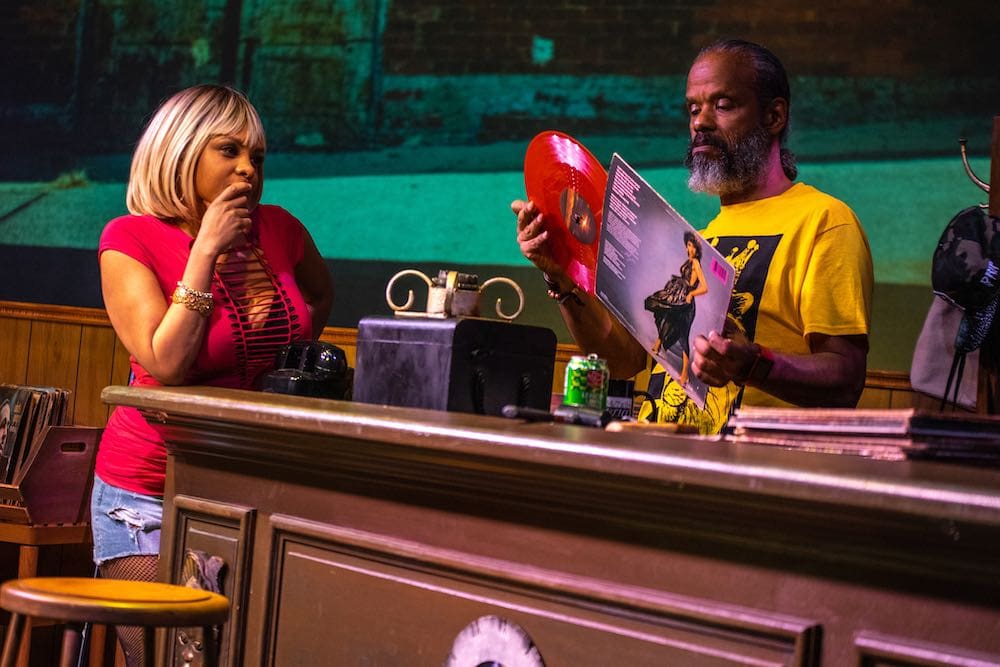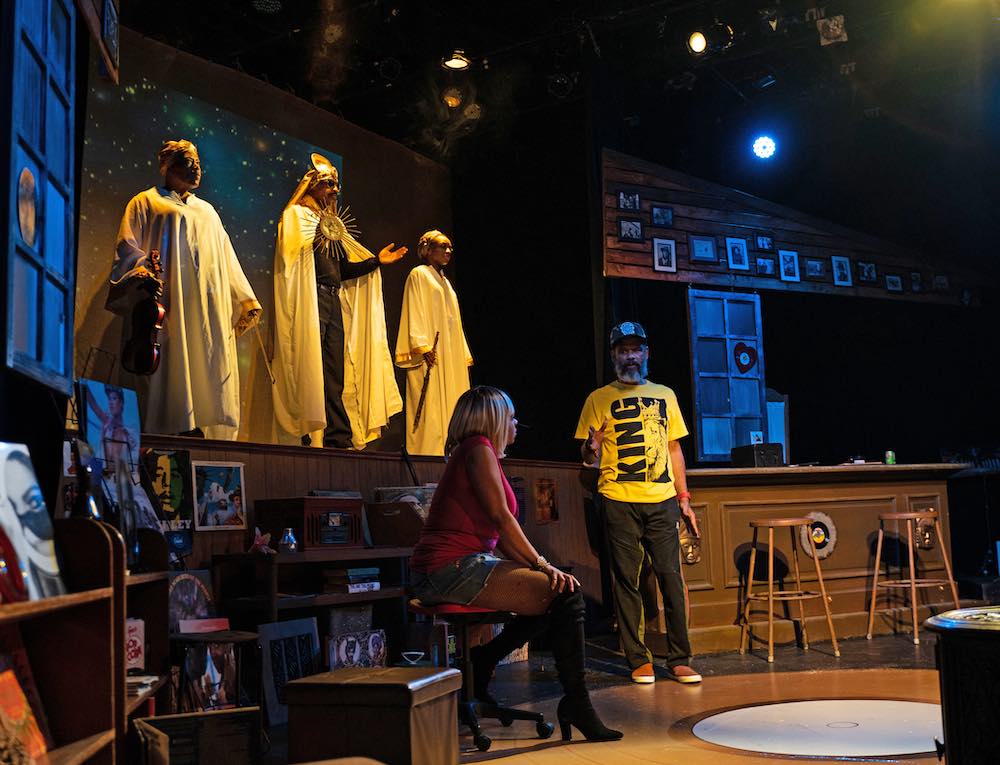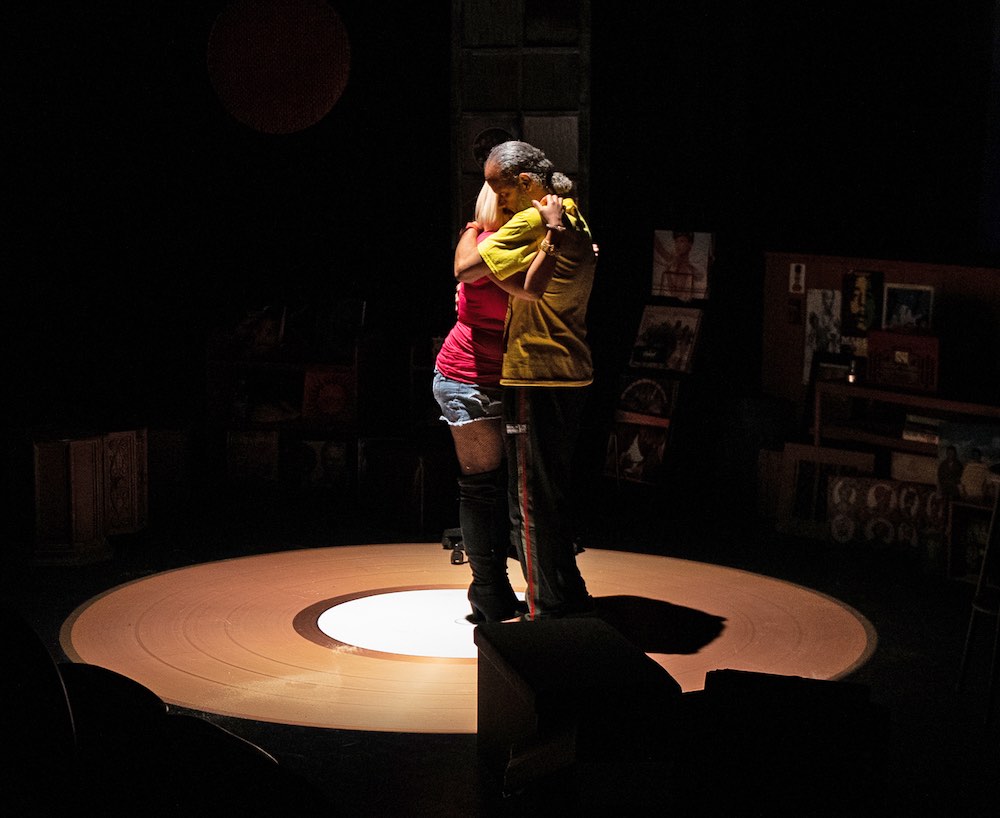Summoning a galaxy of African American recording stars, this poignant one-act sometimes seems like a sublime dream with vintage music. There are ethereal visions, vivid Afrofuturist visitations, and ancestral invocations that cohere more in emotion than in sense. At the same time, the play tells the tender linear story of a young woman who sells sex on the street and an older man who sells vintage LPs in his record shop, where they happen to meet one momentous night.
They don’t have sex. And that’s not a spoiler. Because what they actually have is an unexpected connection that’s far deeper.

The play’s title, RS/24, refers to this 1970s-era record store, which is open 24/7; and Clayton LeBouef, who wrote and directs, plays Hubie, the quietly principled proprietor. LeBouef’s stage and screen acting credits include roles in NBC’s Homicide Life on the Streets and HBO’s The Wire. Impressively persuasive as Hubie, LeBouef becomes the play’s moral center of gravitas.
As playwright LeBouef has drawn inspiration from his stints as a deejay in the DC club scene: “I used to spin vinyl at Ed Murphy’s Supper Club, the Mark IV, and the French Underground,” LeBouef told the Sentinel when RS/24 premiered at Anacostia Playhouse two years ago. “I saw how music could impact people in various ways, and how it was a powerful healing force.”
Anacostia Playhouse has brought back RS/24 for an encore run through February 9, 2020. Co-directed by Cheryl Hawkins and Ella Davis, the revival has been handsomely mounted. The interior of Hubie’s shop is stocked with dozens of vintage LP covers featuring a who’s who of African American recording artists—Lionel Richie, Chaka Kahn, Bob Marley, Marvin Gaye, and many, many more. Stacked on racks, piled in milk crates, even displayed in the blackbox entryway, this abundance of prop merchandise makes the stage set seem more like a living music museum, as though one could walk right in and browse around and hear memories replay.
The whole place has an appealing aura (the set consultant was Megan Holden). Wooden planks suggest a shacklike roof hung with black-and-white photos of recording artists; there’s a sales counter with stools, a vintage turntable on a shelf, some 45s on a spindle; a huge gold platter commands the floor center stage; and behind an upstage raised platform is a projection screen that will reveal the world just outside and a universe beyond.

There’s a prologue of about eight minutes that mystifies in an intriguing way. Under otherworldly colors (John D. Alexander designed lighting), two women in white robes and gold headwraps, perhaps ancient African royalty (costume design is by Luqman Salim; Vaunita Goodman and Jennifer Lee are credited as Arc Angels), sanctify the space with a prayerful magical flower and scattered glitter. This segues to an animated projection of the faces of music greats (Whitney Houston, Cab Calloway, Bessie Smith, Louis Armstrong, Mahalia Jackson, Prince, many more) that appear like exploding novas in a time-travel through starry space (sound and visuals design is by Tewodross M. Williams).
Then we see, striding across the platform against a dark and dank alleyway—in thigh-high boots, blond wig, denim shorts, and a hot pink laced bodice—a woman with a gun. She will drop into Hubie’s all-night record shop and try to seduce him. And the engrossing narrative part of the play is suddenly underway.
Her name, she says, is Melody—though it turns out to be Karma—and she is played by Kazi Jones with very credible street smarts and marketing moves. The scenes between her and Hubie are touchingly written and sensitively performed. Perhaps because Hubie is more intent on respecting and helping Karma than using her, a kind of trust arises in her, maybe for the first time in her life.
LeBouef’s theme of the healing power of music gets a stunning enactment when Karma admits to Hubie that her first time on the street she was terrified—so scared that she ducked into an alley and sang to herself to get up the nerve. Hubie asks her to sing the song. She does, at a mic on a platform stage left, acapella—as if wearing the black jeweled gown with pearls hanging just behind her. Turns out Karma always dreamt of making it as a singer. “Do what you want to do,” Hubie urges. And there comes a gentle moment of nonsexual intimacy between them that just might count as genuine sexual healing.

Interspersed are some more surreal elements. Inexplicably Sun Ra appears in white and gold robe, flanked by the Arc Angles now playing violin and flute; and as if dreamt by Hubie, he poetically intones about how “words soar” and “birds soar” and “songs soar” and they “lift us up to a higher space.” There’s a probably symbolic subplot about a strange box that Hubie received a directive in a dream he should dig up from under a tree. (In a related memory sequence, Lee movingly portrays Hubie’s Grandmother.) And there’s yet another subplot, this one brutally in real time, about Karma’s coworker on the streets (Goodman) and the man named Georgetown (Hull) who pimps and browbeats them.
Hubie’s mission in keeping open his record shop around the clock, he says, is to create “a place blessed with sound, sweet scent, and a purpose to fulfill.” As in any remembered dream, the disparate parts of RS/24 may comprise no logical whole, yet they assemble in the mind as if a unified experience anyway. What lifts RS/24 to a higher place is that in evoking the powerful influence of African American music in story, memory, and dream all at once, it harks back to a past before vinyl gave way to streaming but that is still the present and still points to a purposeful future.
Running Time: 75 minutes, including one intermission.
RS/24 plays through February 9, 2020, at Anacostia Playhouse, 2020 Shannon Place SE, Washington, DC. Tickets are available online.




